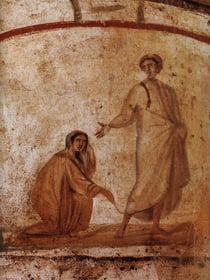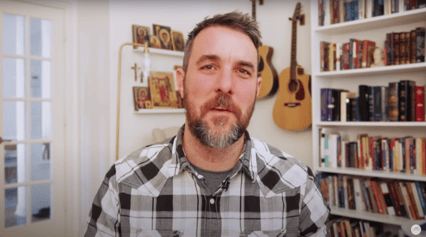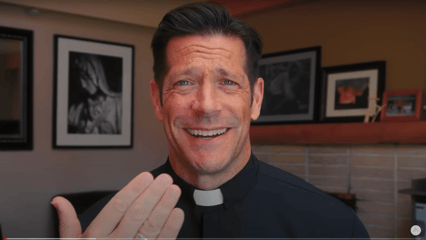if you were a priest, what would you say to someone in the following situation? Someone comes for Confession, confesses something of which they’re very ashamed and about which they’re embarrassed. They can’t believe they did it or keep on doing it. Let’s say they’re crying, too. And they say, “I feel so guilty. I feel awful.” What would you say?
I ask to see if you know how God typically acts in our souls. Once we know, a whole new world opens up! We can start seeing throughout the day where God’s moving and how He’s loving us.
This situation has come up thousands of times in Confession so it’s nothing unique and I’m not violating the seal of Confession. What I generally tell people is, “Your feeling badly is a sign you’re close to God. The fact that your conscience is so sensitive means He’s close to you. That’s how God the Father loves us when we’re far from home. He pricks our conscience so that we realize that we’re meant for more.” So, if we understand God’s patterns of love, then our relationship with Him can blossom.
We can identify six patterns of Jesus’ behaviour from today’s Gospel.
1) The first pattern is a principle: Jesus is looking for us. The text says, “On the first day of the week, two of the disciples were going to a village called Emmaus, about eleven kilometres from Jerusalem, and talking with each other about all these things that had happened. While they were talking and discussing, Jesus himself came near and went with them, but their eyes were kept from recognizing him” (Lk 24:13-16). Jesus draws near to us and walks beside us, so to speak. Many theologians have pointed out that in every religion, man is always seeking God, but in Christianity, God is seeking man.
Do you believe that God has been looking for you recently? If you do, then you’re on the right track. As a response, try to seek Him in return by talking to Him! But, if you don’t feel like He’s looking for you, then pay attention to your conscience, as I just mentioned, and pay attention to the following behaviours of Jesus—these might be more easily recognizable for you.
2) Jesus asks questions about our happiness: “And he said to them, ‘What are you discussing with each other while you walk along?’” (Lk 24:17). Jesus doesn’t ask questions because He doesn’t know the answer, but because He wants us to become more self-aware. After Adam and Eve sinned, God asked, “Where are you?” not to know their location, but because they needed to know where they were in relation to Him.
Every deep question that we ask ourselves or that others pose to us, for example, “How are you really doing? Are we at peace in our conscience? Why are we so lonely and desperate for affection? Why are you so frustrated? For what are you most grateful?” all these questions are asked by Jesus.
3) Jesus corrects us. After the two disciples explain why they’re so sad, “He said to them, ‘Oh, how foolish you are, and how slow of heart to believe all that the Prophets have declared! Was it not necessary that the Christ should suffer these things and then enter into his glory?’” (Lk 24:25-26). This is good news! God used the Prophets, imperfect men, in the Old Testament to teach people.
Who recently has criticized or called us out? Here’s the thing: We often get angry at the prophets in our lives because they have their own problems, but God uses them to wake us up. We can get annoyed at how they said it, but the question remains: Is what they said true? Is it partially true? We need to focus on this question, otherwise we’ll miss Jesus’ correction because we’re focusing on the way the person communicated it to us.
A man here once shared that the words that woke him up to start thinking about his life was when a good friend said in frustration, “You are so selfish.” Has anyone recently said something similar that hurt us? Was it true, partially true?
4) Jesus teaches us the big story of reality. “Then beginning with Moses and all the Prophets, he interpreted to them the things about himself in all the Scriptures” (Lk 24:27). Jesus teaches us in many ways, but one of the most important is understanding the big story of reality. As we’ve said, the Bible is a series of love letters written to us.
Now, do you read the Bible every day? Faith Studies will be starting online in a few weeks, so that might be our impetus to start reading God’s word. And, if we’ve already taken some levels of Faith Studies, then just start with the New Testament.
5) Jesus waits for an invitation. “As they came near the village to which they were going, he walked ahead as if he were going on. But they urged him strongly, saying, ‘Stay with us, because it is almost evening and the day is now nearly over.’ So he went in to stay with them” (Lk 24:28-29). ‘He walked ahead as if he were going on’—why? Because Jesus doesn’t intrude. He won’t force Himself into our lives because He respects our freedom.
We may ask, “If God is real, why doesn’t He show Himself more clearly?” The answer is because we would have to change our lives and we’re not always ready. Alcoholics know they should stop. People with sexual addictions know they should stop. We use our devices too much and know we should stop. Jesus waits for an invitation, a prayer, which is humble of Him. We receive as much as we want from God. Have we invited Him to guide us? Have we told Him that we’re willing to do what He suggests? That willingness will allow Him to help us.
6) Jesus reveals Himself in the Eucharist. “So he went in to stay with them. When he was at the table with them, he took bread, blessed and broke it, and gave it to them. Then their eyes were opened, and they recognized him” (Lk 24:29-31). We pointed out in June 2019 that Scripture scholars note that the four verbs of take, bless, break, and give are the four verbs for the Eucharist, so we know that Jesus was celebrating Mass here.
A story will illustrate how this all works. Burke Masters was from Illinois, a non-Catholic whose parents sent him to a Catholic high school. When he was 14, he had religion class with Sr. Margaret Ann and was intrigued by everything he was learning. One day, after class, she waited for him by the door and said, “Burke, you’re searching for something.” She was right but he didn’t know how to respond. She said, “Read this,” and gave him his first Bible. He started reading St. Matthew’s Gospel and the story of Jesus touched his heart. When he got to the part where Jesus died on the Cross, he said, “If we have a God who loves us that much, I’m all in.”
Even though he didn’t at first believe in the teaching on the Eucharist, two years later, while on a retreat and during Mass, the priest gave everyone Communion, and when Burke opened his mouth to say, “I’m not Catholic,” nothing came out and the priest gave him Communion! But that changed his life. He felt the power of God run through his body in a way he never felt before. He went home that night and announced, “I have to join the Catholic Church.” His parents asked him to wait a year until he was 18, and so he took private instruction and was baptized a year later.
He went off to college on a baseball scholarship, played a year of professional baseball but wasn’t good enough to go further, and was devastated. He went into business, made lots of money, but was bored to death.
During that time, he met Stephanie, the perfect girl to marry, and she brought him to Eucharistic Adoration for the first time in his life. But the silence scared him. In silence, we encounter God and ourselves, and he wasn’t living the life he knew he should be living. They went, however, every Tuesday night for an hour of prayer, and Burke started to face himself. After a while, he started to hear an inner voice, “Burke, I want you to be a priest.” He thought, “I don’t want to be a priest. I want to be a general manager, marry Stephanie, make millions of dollars.” But God continually and gently called him.
He talked to Stephanie about it, and she said, “If this is your call from God, I can’t compete with God, so you have to try this.” He thought he would hate seminary, but after his first year, he felt peace and joy.
A few months later, his good friend Matt called, “Burke, are you happy?” He replied, “I’ve never been happier in my life.” So Matt said, “Good, because I was wondering if I could start dating Stephanie.” Four years later, they got married and guess who witnessed the wedding? “Father” Burke! And then baptized their three daughters! Years later he also became the Catholic chaplain to the Chicago Cubs! By the way, there’s a 30-minute interview of Fr. Burke telling this whole story.
Which pattern of Jesus’ behaviour most strikes us today? Why? How are we going to respond? Is it that: 1) Jesus is looking for us; 2) asks questions about our happiness; 3) corrects us; 4) teaches us the big story of reality; 5) waits for an invitation from us; 6) reveals Himself in the Eucharist? We have the rest of the Mass to ponder these questions. And just like the last two weeks, I’m going to invite you to answer these questions in the online chat afterwards. I’d love to see where God’s moving in your hearts! You can answer this way: “I feel Jesus is looking for me/asking me questions/correcting me, because . This is how I’m going to respond,” etc. And I’ll tell you my answer, too.
Fr. Robert Spitzer, in commenting on Jesus’ behaviour in this Gospel, asks, “Would this be typical of incarnate, unconditional Love? Would He allow us the freedom to grasp Him with our hearts before our eyes and minds?” (Five Pillars of the Spiritual Life, 137). Yeah, this is how God works.
When people come to Confession and start to understand that they’re actually close to God, that He’s loving them through their contrite hearts, that their tears are signs that He’s moving powerfully in their lives, it’s amazing to see them light up with comfort! They get it! And now we, too, understand six ways Jesus is acting in our lives.





